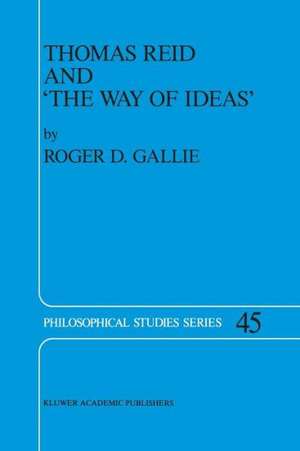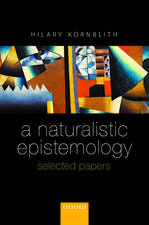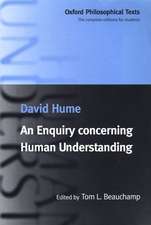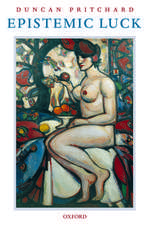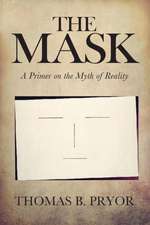Thomas Reid and ‘The Way of Ideas’: Philosophical Studies Series, cartea 45
Autor R.D. Gallieen Limba Engleză Paperback – oct 2011
| Toate formatele și edițiile | Preț | Express |
|---|---|---|
| Paperback (1) | 938.33 lei 6-8 săpt. | |
| SPRINGER NETHERLANDS – oct 2011 | 938.33 lei 6-8 săpt. | |
| Hardback (1) | 943.20 lei 6-8 săpt. | |
| SPRINGER NETHERLANDS – 31 iul 1989 | 943.20 lei 6-8 săpt. |
Din seria Philosophical Studies Series
-
 Preț: 404.79 lei
Preț: 404.79 lei - 15%
 Preț: 640.22 lei
Preț: 640.22 lei - 18%
 Preț: 1111.92 lei
Preț: 1111.92 lei - 18%
 Preț: 998.03 lei
Preț: 998.03 lei - 15%
 Preț: 635.34 lei
Preț: 635.34 lei -
 Preț: 378.43 lei
Preț: 378.43 lei -
 Preț: 388.74 lei
Preț: 388.74 lei - 15%
 Preț: 636.17 lei
Preț: 636.17 lei - 15%
 Preț: 634.56 lei
Preț: 634.56 lei - 18%
 Preț: 1212.50 lei
Preț: 1212.50 lei - 18%
 Preț: 940.19 lei
Preț: 940.19 lei - 18%
 Preț: 948.52 lei
Preț: 948.52 lei - 18%
 Preț: 943.97 lei
Preț: 943.97 lei - 15%
 Preț: 640.72 lei
Preț: 640.72 lei - 15%
 Preț: 636.68 lei
Preț: 636.68 lei - 15%
 Preț: 640.07 lei
Preț: 640.07 lei - 18%
 Preț: 943.66 lei
Preț: 943.66 lei -
 Preț: 383.18 lei
Preț: 383.18 lei - 15%
 Preț: 640.07 lei
Preț: 640.07 lei - 15%
 Preț: 637.46 lei
Preț: 637.46 lei - 15%
 Preț: 638.75 lei
Preț: 638.75 lei - 18%
 Preț: 938.03 lei
Preț: 938.03 lei - 15%
 Preț: 634.06 lei
Preț: 634.06 lei - 20%
 Preț: 553.25 lei
Preț: 553.25 lei - 20%
 Preț: 560.30 lei
Preț: 560.30 lei - 18%
 Preț: 944.27 lei
Preț: 944.27 lei - 18%
 Preț: 886.81 lei
Preț: 886.81 lei - 20%
 Preț: 566.75 lei
Preț: 566.75 lei - 18%
 Preț: 944.75 lei
Preț: 944.75 lei
Preț: 938.33 lei
Preț vechi: 1144.31 lei
-18% Nou
Puncte Express: 1407
Preț estimativ în valută:
179.71€ • 185.15$ • 150.54£
179.71€ • 185.15$ • 150.54£
Carte tipărită la comandă
Livrare economică 24 februarie-10 martie
Preluare comenzi: 021 569.72.76
Specificații
ISBN-13: 9789401075992
ISBN-10: 9401075999
Pagini: 312
Ilustrații: XXII, 287 p.
Dimensiuni: 155 x 235 x 16 mm
Greutate: 0.44 kg
Ediția:Softcover reprint of the original 1st ed. 1989
Editura: SPRINGER NETHERLANDS
Colecția Springer
Seria Philosophical Studies Series
Locul publicării:Dordrecht, Netherlands
ISBN-10: 9401075999
Pagini: 312
Ilustrații: XXII, 287 p.
Dimensiuni: 155 x 235 x 16 mm
Greutate: 0.44 kg
Ediția:Softcover reprint of the original 1st ed. 1989
Editura: SPRINGER NETHERLANDS
Colecția Springer
Seria Philosophical Studies Series
Locul publicării:Dordrecht, Netherlands
Public țintă
ResearchCuprins
I: Investigating our Mental Powers.- 1.1 Hume: Thinking versus feeling.- 1.2 Reid: Conception versus sensation.- 1.3 Laws of our constitution and epistemologically prior principles.- 1.4 How to arrive at laws of nature.- 1.5 Scientific study of the mind?.- II: The Ideal Hypothesis.- 2.1 Ideas as objects of perception.- 2.2 Perception and impressions on the mind.- 2.3 Perception by way of perceiving images.- 2.4 Is the table we see an image?.- 2.5 The role of sensation in perception.- III: The Epistemological Role of Perception.- 3.1 Is there fallacy of the senses?.- 3.2 The appearance of objects to the eye.- 3.3 Reliance on the senses.- IV: The Constituents of Reality.- 4.1 The testimony of the senses and the world of material bodies.- 4.2 Primary versus secondary qualities.- 4.3 Colour versus shape.- 4.4 Are there other minds than mine?.- 4.5 An intelligent Author of Nature?.- V: What Words Signify.- 5.1 Locke’s theory of signification.- 5.2 What proper names and general words signify according to Reid.- 5.3 Individual and general conceptions.- 5.4 Whether proper names signify attributes.- 5.5 The variety of objects of conception.- 5.6 Conceiving the real and the unreal.- 5.7 Attributions to conceivable individuals.- 5.8 Things objectively in my mind.- VI: Active Power.- 6.1 Knowingly giving rise to new actions.- 6.2 Locke on active power.- 6.3 Reid’s account of active power.- 6.4 Difficulties within Reid’s account.- 6.5 Divine prescience and active power.- 6.6 Is every future event already determined?.- 6.7 Moral attributions and active power.- VII; Causality.- 7.1 Concerning some criticisms of Hume’s view of the causal principle.- 7.2 No proof of the causal principle available within Hume’s philosophy.- 7.3 Past instances and the uniformity of nature.- 7.4Presupposition and the authority of experience.- 7.5 Reid’s notion of cause.- 7.6 Wisdom, prudence and causal law.- VIII: Identity and Continuity.- 8.1 The sameness of a person.- 8.2 Amnesia and the same person.- 8.3 The Brave Officer paradox.- 8.4 The sameness of plants and artefacts.- 8.5 What is found on entry into the self.- 8.6 Consciousness and awareness of self.- 8.7 Memories and personal identity.- IX: Of Common Sense and First Principles.- 9.1 How to detect first principles.- 9.2 First principles and modes of argument.- 9.3 Our faculties are not fallacious.- 9.4 The first principles to be employed in the investigation of the mind.- 9.5 Accounting for beliefs.- 9.6 First principles and judgments.- 9.7 Providential Naturalism.- Notes.
